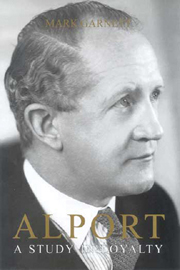Book contents
- Frontmatter
- Contents
- Acknowledgements
- Foreword
- Introduction
- 1 Father and Son
- 2 A National Faith
- 3 “Love and War”
- 4 Reviving Conservatism
- 5 “One Nation”
- 6 Early Postings
- 7 “Political Suicide”
- 8 “More Trouble with the Government, Daddy?”
- 9 A Freelance Diplomat
- 10 Gains and Losses
- Notes
- Bibliography
- Index
- Plate section
Introduction
- Frontmatter
- Contents
- Acknowledgements
- Foreword
- Introduction
- 1 Father and Son
- 2 A National Faith
- 3 “Love and War”
- 4 Reviving Conservatism
- 5 “One Nation”
- 6 Early Postings
- 7 “Political Suicide”
- 8 “More Trouble with the Government, Daddy?”
- 9 A Freelance Diplomat
- 10 Gains and Losses
- Notes
- Bibliography
- Index
- Plate section
Summary
The original purpose of this book was to tell the story of the Conservative “One Nation” group of MPs from the viewpoint of one of its founder members. The group has played an important role in the politics of Britain during the second half of the twentieth century – originally as a kind of “think tank” within the Conservative Party, then as a pool of talent for Conservative ministries, and, in recent years, as the source of a slogan for the Conservatives and the Labour Party. “Cub” Alport never became as famous as other founder members, who included Edward Heath, Enoch Powell, Iain Macleod, Robert Carr and Angus Maude. But unlike the obscure members – Richard Fort, Gilbert Longden and Sir John Rodgers – his name generally cropped up in published studies of the period, and his archive of over fifty boxes (which include the early minutes of “One Nation”) promised to reveal new insights into the group and its times.
The original members did not know when they set up “One Nation” that a group of Conservatives would still be meeting under that name at the end of the century; they would have been amazed (or aghast) back in 1950 to learn that within fifty years a Labour leader would try to win votes by posing as a “One Nation” politician. Most of them were ambitious, but they had no idea how famous they would become and not one of them wrote a contemporary account of their early meetings.
- Type
- Chapter
- Information
- AlportA Study in Loyalty, pp. xvii - xxiiPublisher: Acumen PublishingPrint publication year: 1999



